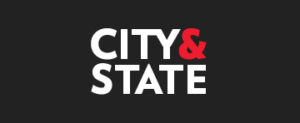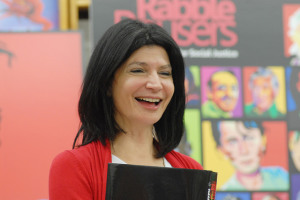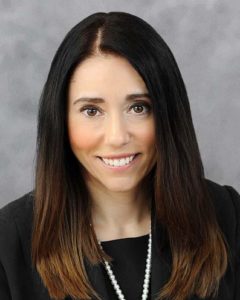Remarks by AFT President Randi Weingarten
AFT TEACH 2017
Washington, DC
July 20, 2017
Weingarten was introduced by Claudia Marte, her former student at Clara Barton High School in Brooklyn, N.Y.
I. Introduction—My Day with Betsy
Welcome to TEACH!
I know many of you have just arrived in Washington (and you can understand why we call it the swamp), but let me start by taking you on a trip, to a town in Ohio called Van Wert.
Like many rural areas in America, Van Wert has grown increasingly Republican. And in the November 2016 election, it went overwhelmingly Republican.
Does that mean that the people of Van Wert agree with everything Donald Trump and Betsy DeVos are trying to do, like end public schools as we know them in favor of vouchers and privatization and making education a commodity?
Not in the least.
The people of Van Wert are proud of their public schools. They’ve invested in pre-K and project-based learning. They have a nationally recognized robotics team and a community school program that helps at-risk kids graduate. Ninety-six percent of students in the district graduate from high school. This community understands that Title I is not simply a budget line but a lifeline.
Why I am telling you about this town? Because these are the schools I wanted Betsy DeVos to see—public schools in the heart of the heart of America.
Unfortunately, just like climate change deniers deny the facts, Betsy DeVos is a public school denier, denying the good in our public schools and their foundational place in our democracy. Her record back in Michigan, and now in Washington, makes it clear that she is the most anti-public education secretary of education ever.
Betsy DeVos called public schools a “dead end.” Our public schools aren’t a dead end. They’re places of endless opportunity.
They’re where 90 percent of America’s parents send their children. And while Secretary DeVos may have thought Van Wert would be a good photo op, my goal, like any educator, was to teach her something.
And we did: Great things are happening in our public schools. And with the right support, they can do even better. That’s what she saw in Van Wert, and that’s what’s happening in public schools across the country. Betsy DeVos cannot claim ignorance of what’s happening in public schools—only indifference.
But how can you be indifferent when you hear from someone like Claudia?
I remember Claudia’s history class—the great discussions and the lively debates. But I also remember some grousing that I was pushing the class too hard. (Claudia, I didn’t push you nearly as hard as you pushed yourself.) And I could not be more proud that my former student is a member of AFT Local 243 in Madison, Wis.
Everyone in this hall has their Claudias. It’s why we do what we do. And it’s why we are going to hold Betsy DeVos accountable for her indifference, and for her attacks on our profession and on public education.
But her attacks are not the only challenges we face. She’s not the only ideologue who wants to destabilize and privatize the public schools that millions of Americans value and rely upon.
Let me be blunt: We are in a David versus Goliath battle. And in this battle, we are all David.
II. How Did We Get Here?
So how did we get here?
It didn’t just happen last Election Day or Inauguration Day.
The moment we’re in is the result of an intentional, decades-long campaign to protect the economic and political power of the few against the rights of the many. It has taken the form of division—expressing itself as racism, sexism, classism, xenophobia and homophobia. And its intentions are often disguised. For example, take the word “choice.”
You hear it all the time these days. School “choice.” Betsy DeVos uses it in practically every sentence. You could show her, as I did, an award-winning robotics program, and she’d say “What about choice?” which she actually said. You could probably say “Good morning, Betsy,” and she’d say, “That’s my choice.” She must love restaurant buffets.
But let me be really serious. Decades ago, the term “choice” was used to cloak overt racism by segregationist politicians like Harry Byrd, who launched the massive opposition to the Brown v. Board of Education Supreme Court decision.
After the Brown decision, many school districts, especially in the South, resisted integration. In Virginia, white officials in Prince Edward County closed every public school in the district rather than have white and black children go to school together. They opened private schools where only white parents could choose to send their children. And they did it using public money.
By 1963, African-American students had been locked out of Prince Edward County public schools for five years. AFT members sent funds and school supplies. And some traveled from New York and Philadelphia to set up schools for African-American students in church basements and public parks, so these students could have an education.
And what about the schools Betsy DeVos appallingly called “pioneers of school choice”—historically black colleges and universities? HBCUs actually arose from the discriminatory practices that denied black students access to higher education. HBCUs are vital institutions, but that doesn’t change the truth of their origins: They were born of a shameful lack of educational choices for African-American students.
Make no mistake: The “real pioneers” of private school choice were the white politicians who resisted school integration. But neither facts nor history seems to matter to this administration.
In March, DeVos gave a speech here in Washington. She justified “choice” by saying: “I’m simply in favor of giving parents more and better options to find an environment that will set their child up for success.”
Who could disagree with that? It’s not ideological to want a school that works for your kid. It’s human. But her preferred choices—vouchers, tuition tax credits, and private, for-profit charter schools—don’t work.
And, after decades of experiments with voucher programs, the research is clear: They fail most of the children they purportedly are intended to benefit.
The Department of Education’s own analysis of the D.C. voucher program found it has a negative effect on student achievement. The Louisiana voucher program has led to large declines in kids’ reading and math scores. Students in Ohio’s voucher program did worse than children in its traditional public schools. And I could go on and on about for-profit and online charters, as well.
And, while parents are promised greater choice, when a family uses a voucher for a child to attend a private school, in reality it is the school—not the family—that makes the choice.
That’s because private schools can—and many do—discriminate, because they don’t follow federal civil rights laws. Vouchers increase racial and economic segregation. And they lack the accountability that public schools have. Many voucher programs, like the one here in Washington, D.C., don’t even reveal how much public funding they receive or how students are performing. DeVos defends this lack of transparency, saying the important thing is not quality or accountability, but—what? Choice.
These choices do not increase student achievement. They do not reduce inequity or segregation. They drain funds from and destabilize our public schools. And they move us further away from the choice every child in America deserves—a well-supported, effective public school near their home.
But Trump and DeVos are not backing off their support for vouchers, for-profit charters and other privatization schemes. They have proposed a $250 million “down payment” they want to follow with billions of public dollars for vouchers and tuition tax credits. And you know how they plan to pay for it? By cutting federal education spending that goes directly to educate children in public schools by $9 billion.
Make no mistake: This use of privatization, coupled with disinvestment are only slightly more polite cousins of segregation. We are in the same fight, against the same forces that are keeping the same children from getting the public education they need and deserve. And what better way to pave the path to privatize education than to starve public schools to the breaking point, then criticize their shortcomings, and let the market handle the rest. All in the name of choice.
That’s how a democracy comes apart.
On the 60th anniversary of the Brown v. Board of Education decision, I was in Topkea, Kansas, the home of the plaintiffs in the Brown case. I was there to support the fight against Gov. Sam Brownback’s draconian disinvestment from public education.
The big idea behind the governor’s “real-live experiment” with trickle-down economics was that cutting taxes for the wealthy and corporations, and slashing public services, would somehow lead to an economic boom.
There was no boom—only devastating cuts to public schools and other services, and a bust for the state’s economy. This spring the Kansas Supreme Court found that the people who’d suffered the most were black, Hispanic and poor students.
We fought this vile experiment. And last month even the Republican-controlled Kansas state Legislature forced Gov. Brownback to increase public education funding by nearly $500 million.
We took a stand in Prince Edward County. And we took a stand in Kansas. Both fights were long and hard. We didn’t give up, and we didn’t do it alone, with one tweet, one speech or one demonstration.
III. How Do We Move Forward? Five Values (Five Smooth Stones)
Yes, it’s exhausting. We have to fight harder and harder just to keep from losing ground. But I haven’t lost heart or faith, because, although we face formidable adversaries, we are David to their Goliath.
When leaders controlling the federal government are hell-bent on taking away healthcare from 32 million people in order to give a tax cut to the ultra-wealthy, we are David to their Goliath. When officials far from the classroom care a whole lot about testing and test scores, but don’t give a damn about what our students really need, we are David to their Goliath. When hedge funders, billionaires and anti-labor ideologues band together in an axis of inequality, further rigging our political and economic system against working folks, we are David to their Goliath. When a presidential administration takes actions that make immigrant students afraid to dream, that favor fraudulent for-profit colleges over students seeking an education, that put an entire religion in its crosshairs, we are David to their Goliath. When governors in state after state go after labor rights and voting rights, and they find an ally in the newest Supreme Court justice who will hear the Janus case, we must be David to their Goliath.
Years ago, I had the opportunity to visit the Valley of Elah, where the standoff between David and Goliath took place. And if you remember Sunday school, you’ll recall: That wasn’t a fair fight either. Goliath was big; David was a little guy. Goliath had an army. And David? David had a sling—with five smooth stones. But David had a plan. Goliath no doubt assumed his greater strength was enough, but we all know how that ended up.
I like the fact that, in our sling, we also have five smooth stones. Five values that we are translating into action. What are they?
- First, Americans deserve good jobs that pay a decent wage, and provide a voice at work and a secure retirement.
- Second, they deserve healthcare so people are not one illness away from bankruptcy.
- Third, they need public schools that are safe and welcoming and prepare young people for life and citizenship, career and college. And speaking of college, it must be affordable.
- Fourth, none of this happens without a strong and vibrant democracy, including a free press, an independent judiciary, a thriving labor movement, and the protection—not suppression—of the right to vote.
- And fifth, there is no democracy without safeguarding the civil rights of all. That means fighting bigotry and discrimination—like the attacks on immigrants, Muslims and transgender kids, and the rising tide of anti-Semitism and racism.
I am on the road more often than not, or at least it feels that way. And I get to talk with a lot of people. Here’s what I’ve seen and heard: No matter where people are from, or their political persuasion, there is a common set of aspirations—for themselves and their families. When we connect on values—these values, these five stones—we win. We help make people’s lives better, and we repair the common ground that has been jackhammered apart.
IV. Four Pillars
Well, David had his five stones, but he only needed one. And while I could talk at length about each of these five core values, I want to focus on one: powerful, purposeful public education.
Great things are happening in public schools in every community in America, and we need to lift them up. Poetry slams. Socratic seminars. Science fairs. Speech therapy. Students checkmating their chess coach. A once-struggling student reading on grade level.
Any one of you could talk about things going on in your classroom and your school that you’re proud of—and I hope you will! In New York City, the United Federation of Teachers (my home local) started what they call #PublicSchoolProud—you saw it in the video. This campaign is now taking hold in Florida, New Mexico, Ohio and Texas. It’s one of the ways school employees, parents and communities are showing that there is so much to be proud of in our public schools.
We get that public schools are not perfect and that every one doesn’t always work for every one of its students. We know that schools in America have always been unequal, often based on race and class.
But I’ve never heard a parent say, “That school doesn’t work for my kid. So I want to engage in an ideologically driven market-based experiment that commodifies education and has been proven to be ineffective.”
No, most of the time parents want a neighborhood public school that works for their child. They want their child to feel safe. They want their school to have adequate resources and small enough class sizes. They want their school to have music, art and science. They want their child to soar in challenging classes and get support when they struggle. They want their child to fill the dinner table conversation with stories about what they did in school that day.
Our public schools are filled with dedicated professionals who are doing their level best—despite never having enough funding, despite the relentless attacks, despite misguided policies gussied up as “reforms” and despite the challenges children bring from home.
And with some key investments and the right strategies, we’ll not just have the will, we’ll have the way.
So as far as I’m concerned, the only choice is: Do we as a nation strengthen and improve our public schools, or don’t we?
We know what works to accomplish this: investment in and focus on four pillars of powerful, purposeful public education:
- Children’s well-being;
- Powerful learning;
- Educators’ capacity; and,
- Collaboration.
Children’s well-being means meeting children where they are—emotionally, socially, physically and academically; making sure they feel safe and valued. Since half of the kids in public schools are poor, that also requires confronting the reality of poverty. One way is to coordinate the services kids need in community schools. The AFT Innovation Fund is helping our affiliates open and expand community schools.
What about powerful learning? Public schools are asked to develop students academically and personally. That doesn’t happen by testing and test prep. It happens when learning engages students and encourages them to investigate, strategize and collaborate. It’s why we fight fiercely for art and music and project-based learning like the computer animation career-tech program the AFT Innovation Fund is supporting in Miami.
And what about developing our capacity as educators? How many times in your career have you been thrown the keys and told to just do it? No one would tolerate that for pilots or doctors or our armed forces. But educators? Please…
We continue to fight against the infantilization of teachers and the “teachers should be seen and not heard” sentiment of people who make decisions affecting teaching and learning, but who haven’t spent 10 minutes in a classroom. That’s the purpose of the AFT Teacher Leaders Program, which now counts 800 participants. Thousands of members have participated in AFT professional development. And hundreds of thousands more have developed their skills through Share My Lesson and the professional development offered by our state and local affiliates.
The glue that holds all this together is collaboration: school employees, parents and community partners working together. When schools struggle, the response too often is top-down takeovers and firing staff. Those approaches are “disruptive”all right—another term public school deniers love—but they are not effective.
Just look at McDowell County, W.Va., the eighth-poorest county in the United States, where coal used to be king. The state took over the school district for a decade. Nothing changed. But now, after an AFT-led partnership that utilizes these four pillars, graduation rates are up by double digits. Most importantly, we are helping change children’s lives.
These four pillars won’t be built on hopes and wishes, they’ll be built on learning effective strategies—which you’re doing here at TEACH —and on investment.
Investment is crucial. But Trump and DeVos, and many states, are actually going in the opposite direction. They tell the lie that public schools are failing, and they try to make huge budget cuts to make the lie real.
The Trump-DeVos budget zeros out resources for reducing class size and for teacher professional development, and strips all funding for community schools, and afterschool and summer programs. So offerings like the summer learning program at D.C.’s Brightwood Education Campus, which I visited this week, would be gone, along with its Springboard program, a summer literacy course for students in kindergarten to second grade. This program not only prevents summer learning loss, but in the five weeks of classes, has increased students’ literacy levels by 3 ½ months. In essence, the Trump-DeVos budget takes a meat cleaver to public education.
And it’s not just the education cuts. While Trumpcare might be on hold right now, the battle is far from over. Its $880 billion cut from Medicaid was inhumane. And it would mean, for the almost 80 percent of school districts that rely on these funds, the loss of school nurses and health screenings, wheelchairs and feeding tubes, for our most vulnerable kids.
And for what? A tax cut for the wealthiest Americans?
These cuts rob children of opportunity. That’s why we fight them, with actions like the lobbying and rallying many of you did yesterday. And people are with us. The AFT recently commissioned a poll. Three-quarters of the people we talked to oppose the deep cuts to education that Trump and DeVos are proposing. And just as many oppose taking away funding from public schools to increase funding for private school vouchers and charter schools.
V. RESIST—AND RECLAIM
While people have always supported public education, what makes this moment different is that now, millions of Americans are hungry to fight for something better. But with the daily outrages and the relentless assaults on our values and our democracy, it can be hard to know where to begin.
Well, it begins with elections. They have consequences—big time. Voting really matters. But what can we do between elections? That’s where one of the books I’ve become obsessed with helps. It’s by Yale history professor Timothy Snyder. It’s called On Tyranny: Twenty Lessons from the Twentieth Century. And you got a copy in your conference bag.
Snyder’s 20 lessons are told through the lens of history. They sharpen our understanding of what is going on around us. And these lessons are important because most of today’s students were born after Nazi genocide, after apartheid, after the Berlin Wall fell, and after de jure segregation in the United States had been outlawed. They could have, as Snyder writes, the “sense that history could move in only one direction: toward liberal democracy.” Tragically, that’s just not true.
Snyder writes, “History does not repeat, but it does instruct. … History can familiarize, and it can warn.” He reminds us that we can’t take our institutions for granted. That dictators throughout history have built power by kneecapping trade unions and co-opting or undercutting public education.
Believe in truth. Listen for dangerous words. Contribute to good causes. Be a patriot. Defend institutions, such as unions. There is something that each of us can do to defend democracy and fight tyranny.
And if the next generation is to take up the fight, who better to teach them than America’s educators? So I am asking you: Let’s take our responsibility to resist injustice full on. And let’s take our responsibility to reclaim the future full on. Classroom by classroom. Community by community.
If I could ask you to do anything, it would be this: Tell your stories. Advocate for your students. Do it in public. Shine a light. Use social media. Show the people here in Washington what’s happening at home. Show them what a budget cut means in very human terms. Many of you are doing this already. And we are not alone. Take a look. This is a photo of the inauguration last January. And this is from the Women’s March just one day after—and so is this, and this, and this. No, we are not alone.


Yes, those millions—yes, millions—of people who have protested since Election Day are, as the kids say, woke. They are energized—energized to fight against bigotry and hate, to fight for an economy that works for everyone and an America that leads the world.
Why do we teach our students about Dr. King’s letter from Birmingham jail? Or Cesar Chavez’s organizing of immigrant workers, or Mahatma Gandhi’s fasts, or Malala’s ordeal? Because we know that nothing is more inspiring than when people whom the powerful want to keep down, rise up.
And we, too, will rise.
To rise takes more than a moment, or even a hundred moments. It takes a movement. And you are part of that movement. So:
- If you are a local union president, please rise!
- If you’ve been part of the AFT Teacher Leaders program, rise up!
- If you have participated in an AFT professional development course, rise up!
- If you have downloaded or uploaded a resource on Share My Lesson, rise up!
- If you have bought school supplies for your students, or food for a hungry kid, please rise!
- If you’ve spent a sleepless night worrying about a student, please rise!
- If you have lobbied for a cause you believe in, rise up!
- If you are #PublicSchoolProud, rise up!
- If you know that the union can help empower you to make our communities and our world a better place, please rise!
By resisting, and reclaiming the promise of public education for all of our students, we will preserve our democracy. We will protect our most vulnerable. We will strengthen our communities. We will take on Goliath. And we will win.









Comments are closed.